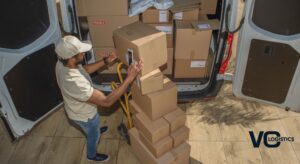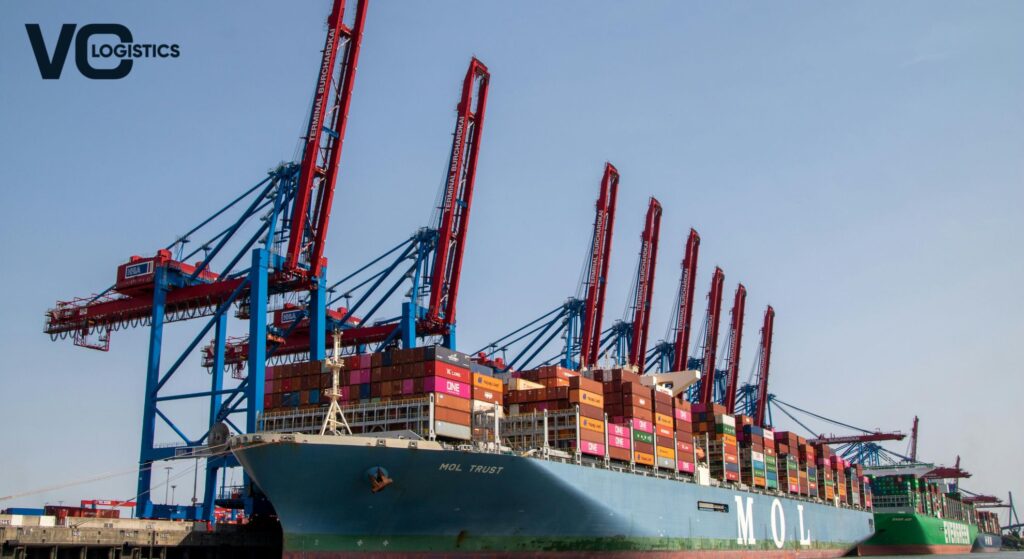If you’ve ever dipped your toes into global shipping, you’ve probably come across three confusing words: freight forwarding, shipping, and logistics. And let’s be honest, it’s easy to mix them up. They all sound like “moving stuff,” right?
But here’s the truth: they’re not the same. Each plays a different role, and knowing which one you need can save you time, money, and plenty of headaches.
Think of it like planning a road trip. Shipping is the car ride itself, freight forwarding is the travel agent who books your ride and takes care of all the messy details, and logistics is the full road trip plan – your hotels, food stops, sightseeing, everything.
Freight Forwarding: The Middleman You’ll Love
Let’s start here :
Imagine you want to import furniture from Italy. Sounds exciting, right? But then reality hits. You realize you need to:
- Pick a shipping line or airline
- Handle tons of customs forms
- Negotiate prices
- Track your goods as they move
Exhausting, isn’t it?
That’s where a freight forwarder comes in. They don’t own ships or planes. Instead, they:
- Arrange the whole process for you
- Handle paperwork
- Find the cheapest and fastest routes
- Deal with carriers on your behalf
Think of them as the travel agent for your cargo. You tell them where you want your goods, and they figure out the best way to make it happen.
Shipping: The Actual Ride
Now let’s zoom in on shipping. This one’s simple. Shipping is just the act of moving goods. That’s it.
It can be by sea, air, road, or rail. If your cargo is on a plane flying to New York, that’s shipping. If it’s on a truck going from Delhi to Mumbai, that’s shipping too.
So, if freight forwarders are booking the ride, shipping is the ride itself.
Logistics: The Master Planner
Now comes the big one: logistics. This is the bigger picture.
It’s not just about moving stuff. Logistics makes sure the whole chain works properly. That means:
- Storing products in warehouses
- Keeping track of inventory
- Packaging goods properly
- Handling customs clearance
- Planning delivery to the final customer
Logistics is like the master planner of the trip. They don’t just book the ticket, they plan every single detail so nothing goes wrong. They also help save time and money by spotting problems before they happen, and make sure your goods arrive safely and on schedule every time.

The Big Differences Made Simple
Here’s the easiest way to remember:
| Term | What It Means | Easy Example |
| Freight Forwarding | Arranging and managing your shipment | Travel agent booking your holiday |
| Shipping | Physically moving goods | The actual flight, bus, or car ride |
| Logistics | Managing the whole supply chain | Your full holiday plan – flights, hotels, meals |
When Freight Forwarding Is the Smart Pick
So, when should you choose freight forwarding?
- If you’re new to importing/exporting and don’t want to deal with complicated forms.
- If you want a single point of contact instead of chasing different carriers.
- If you’re moving goods across countries and want someone who knows the rules.
In short, if you want peace of mind, freight forwarding is your best friend. They take care of the stress so you don’t have to. Plus, they can help you save money by finding the best routes and rates, and they’re great at handling any surprises along the way – like delays or customs hiccups.
When Shipping and Logistics Take the Lead
- Choose shipping when you already know the carrier, the route, and the costs. For example, if you’ve been doing this for years and just need the goods to move, shipping alone works.
- Choose logistics when you need more than just movement. Maybe you run an e-commerce store. You don’t just need transport – you need warehousing, packaging, inventory tracking, and doorstep delivery. That’s where logistics comes in.
So, if shipping is one piece of the puzzle, logistics is the whole puzzle board. It also helps you stay on top of your business, making sure nothing gets lost or delayed, and keeps your customers happy with on-time deliveries every time.
Common Myths People Still Believe
Myth 1: Freight forwarding, shipping, and logistics are all the same.
Nope – they’re different roles with different jobs.
Myth 2: Only big companies use freight forwarders.
Not true. Small businesses actually benefit the most because they don’t have large teams to handle paperwork.
Myth 3: Logistics is just another word for transport.
Wrong. Logistics covers storage, planning, packaging, and delivery too.
Myth 4: Shipping always means by sea.
No way. Shipping includes air, road, and rail too.
Myth 5: Doing it yourself is cheaper.
It might look cheaper, but one small customs mistake can cost you thousands.
Final Takeaway
Let’s wrap it up nice and simple:
- Freight forwarding = your cargo’s travel agent.
- Shipping = the actual trip.
- Logistics = the entire plan from start to finish.
The “right choice” depends on your needs. Sometimes you just need the ride (shipping). Sometimes you need the big picture (logistics). And sometimes, you want someone to take care of everything in between (freight forwarding).
Whatever the case, picking the right partner makes life a lot easier. And if you’re looking for one, VO Logistics can be the partner that keeps your supply chain stress-free.
FAQs
Q1. Is freight forwarding the same as logistics?
Nope. Freight forwarding is about arranging the shipment. Logistics is the bigger picture, covering storage, packaging, and delivery.
Q2. Do freight forwarders own ships or trucks?
No – they don’t. They act as middlemen who book space with carriers for you.
Q3. Can small businesses use logistics services?
Absolutely. In fact, small businesses often benefit the most because logistics partners handle the heavy lifting.
Q4. What’s cheaper, doing it yourself or hiring a forwarder?
Hiring a forwarder usually saves money long-term because they prevent costly mistakes and get better deals.
Q5. Is global shipping always international?
Not at all. Shipping can be local too – within the same country – by road, rail, or even air.
Copyright: All rights reserved. Unauthorized reproduction or distribution of any content on this site is prohibited. For permissions, please contact https://www.virtualoplossing.net/.


